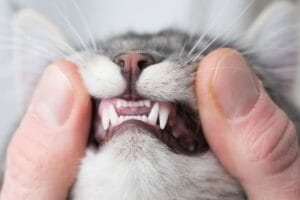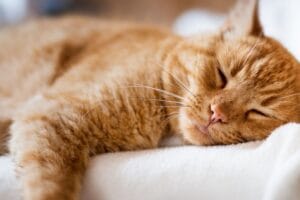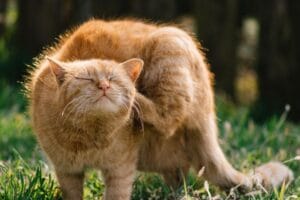What Do Maine Coon Cats Eat? (A Complete Guide)
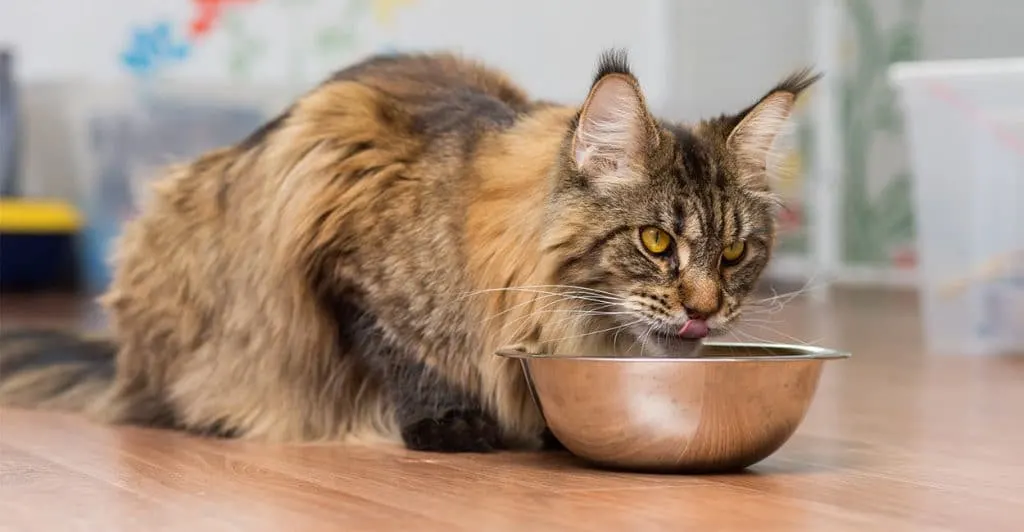
Maine Coon cats, known for their imposing size and friendly nature, deserve a well-rounded and nutritious diet to support their active lifestyle and overall health. As responsible pet owners, understanding, “What do Maine Coon cats eat?“, is crucial to ensure they thrive and lead a happy life.
This comprehensive guide aims to shed light on their dietary needs, providing essential information on their natural diet, nutritional requirements, suitable commercial cat food, feeding frequency, homemade and raw diet options, treats, hydration needs, foods to avoid, and special considerations.
- Natural Diet and Evolution of Maine Coon Cats
- Nutritional Requirements of Maine Coon Cats
- How Often to Feed a Maine Coon Cat:
- How Much to Feed a Maine Coon Cat:
- Wet vs Dry Food for Maine Coons:
- Best Commercial Food options for Maine Coon Cats
- Homemade Food Options for Maine Coon Cats
- Foods to Avoid Feeding Maine Coon Cats
- Ending Note
Natural Diet and Evolution of Maine Coon Cats
Maine Coon cats, often referred to as the “gentle giants” of the feline world, have a fascinating history that influences their dietary preferences and nutritional needs. Believed to have originated from the harsh winters of Maine, USA, these cats evolved to thrive in a challenging environment where they relied on their hunting prowess to survive. Their ancestors roamed the forests and coastal regions, preying on small mammals and birds, forming the foundation of their natural diet.
The evolution of Maine Coon cats as skilled hunters in the wild has left a lasting impact on their feeding behavior and dietary requirements as domesticated cats. Despite the evolution from wild to domesticated, Maine Coons have retained many of their ancestors’ instincts, including a strong desire for animal-based proteins. The consumption of animal tissues provided essential amino acids, including taurine, which are vital for maintaining their health.
As a result of their natural diet and evolutionary background, Maine Coon cats have a preference for meat-based diets and tend to thrive on diets that are rich in high-quality animal proteins. Understanding their natural diet is crucial for providing a balanced and satisfying diet that meets their nutritional needs as well as supports their overall well-being.
Nutritional Requirements of Maine Coon Cats
Maine Coon cats, with their larger size and majestic presence, have specific nutritional requirements that set them apart from other cat breeds. To ensure these gentle giants thrive, it is essential to provide them with a diet that meets their unique needs.
1. Protein:
Maine Coon cats require a higher percentage of protein in their diets as opposed to other cat breeds. Ideally, their diet should consist of approximately 35% to 45% protein content. High-quality animal-based proteins from sources like chicken, turkey, fish, and beef provide the necessary amino acids for muscle development, tissue repair, and other vital physiological functions.
2. Fat:
Fat is an essential component of a Maine Coon cat’s diet, providing a concentrated source of energy and promoting healthy skin and a glossy coat. Their diet should contain around 15% to 25% fat. Fats are also crucial for the absorption of fat-soluble vitamins, such as vitamins A, D, E, and K, which play a vital role in various bodily functions.
3. Carbohydrates:
Maine Coon cats have a limited need for carbohydrates. In the wild, their carbohydrate intake primarily came from the partially digested contents of their prey’s stomach. In commercial cat food, carbohydrates may contribute approximately 5% to 10% of their diet’s total caloric intake. Carbohydrates in cat food mainly serve as a source of energy, but their primary nutritional requirements come from animal-based proteins and fats.
4. Vitamins and Minerals:
Maine Coon cats require a balanced intake of vitamins and minerals to support their overall health. Vitamins A, D, E, and K are essential for various bodily functions, including vision, bone health, and blood clotting. Key minerals like calcium, phosphorus, and magnesium are crucial for strong bones, teeth, and muscle function. The precise percentages of vitamins and minerals may vary, but a well-formulated cat food will provide all the necessary micronutrients in appropriate proportions.
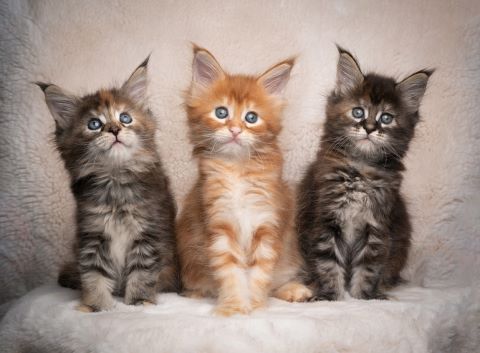
How Often to Feed a Maine Coon Cat:
The feeding frequency for a Maine Coon cat is influenced by several factors, including their age, activity level, and overall health. As kittens, Maine Coons require more frequent feedings to support their rapid growth and development. For kittens up to 6 months old, it is recommended to feed them 3 to 4 times a day. This ensures they receive the essential nutrients needed for their energetic lifestyle and to build strong bones and muscles.
Once Maine Coon cats reach adulthood, their feeding schedule can be adjusted. Feeding them twice a day is a common approach for adult cats. This helps maintain a healthy weight and prevents overeating. However, some cats may prefer multiple smaller meals throughout the day, especially if they are more active or have a higher metabolism.
As cats age, their metabolism may slow down, and they may become less active. Senior Maine Coon cats may benefit from three meals a day, consisting of smaller portions to accommodate their changing dietary needs.
How Much to Feed a Maine Coon Cat:
Determining the appropriate portion size for a Maine Coon cat is essential to maintain their optimal weight and overall health. The right amount of food depends on their age, activity level, and the caloric content of the cat food being used.
Adult Maine Coon cats should be fed based on their caloric needs and activity level. On average, a healthy adult Maine Coon requires approximately 250 – 450 calories per day. This can vary depending on factors such as their age, gender, and level of activity.
A good formula to follow is that a Maine Coon Cat needs about 50 – 70 calories per 1kg of body weight. For reference, Maine Coon Males weigh from about 15-25 lbs. (6.8 – 11.3 kg). The average female Maine Coon weighs between 8-12 lbs. (3.6-5.4 kg).
For kittens, it is crucial to follow the guidelines provided on the cat food packaging or consult with a veterinarian to determine the correct portion sizes based on their age and weight.
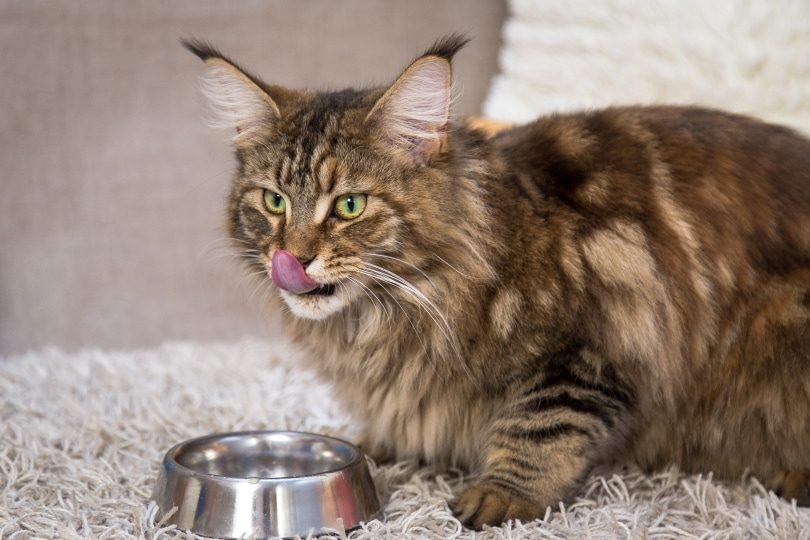
Wet vs Dry Food for Maine Coons:
When it comes to choosing the right type of cat food for Maine Coon cats, pet owners often face the dilemma of deciding between wet and dry options. Both wet and dry cat food have their advantages and considerations, and understanding the unique needs of Maine Coon cats can help make an informed decision.
1. Wet Food:
Wet cat food, also known as canned or moist food, has a higher moisture content compared to dry food. This higher moisture content is beneficial for Maine Coon cats, as it helps support their hydration, especially for cats that may not drink enough water on their own. Adequate hydration is essential for maintaining healthy kidney function and overall well-being.
Additionally, wet cat food is often more palatable due to its appealing texture and aroma. This makes it an excellent choice for picky eaters or cats with dental issues, as it is easier to chew and swallow. For Maine Coon kittens or elderly cats, wet food can be gentler on their developing or aging teeth.
2. Dry Food:
Dry cat food, also known as kibble, offers convenience and ease of storage. It has a lower moisture content compared to wet food, making it a more calorie-dense option. For Maine Coon cats that tend to graze throughout the day, leaving out dry food can be a practical solution.
Dry cat food can also be beneficial for promoting dental health. The act of chewing on the kibble can help reduce tartar buildup and keep their teeth clean.
The Ideal Approach:
For a well-rounded diet, many Maine Coon owners choose to incorporate both wet and dry cat food into their feline’s diet. This approach allows cats to enjoy the benefits of both options. Providing a combination of wet and dry food can offer variety in texture and taste, which can be appealing for cats with selective preferences.
Best Commercial Food options for Maine Coon Cats
In this section we will present some food options for Maine Coon Cats. We have aimed to cover a diverse category of foods, including dry food, wet food, senior-friendly, and kitten-friendly options. We have selected the top-of-the-line products of each category here for you.
Hill’s Science Diet Dry Cat Food for Kittens
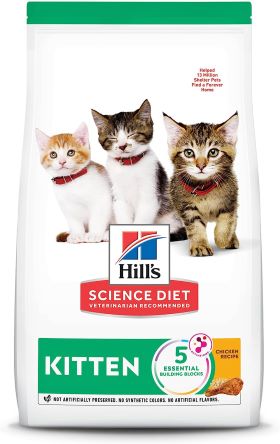
- Dry Cat Food.
- Designed for Kittens specifically.
- Reasonably Priced.
- Very Positively Received.
Introducing Hill’s Science Diet Kitten Healthy Cuisine Roasted Chicken & Rice Medley – the perfect dry food to meet the nutritional needs of growing Maine Coon kittens! Packed with DHA from fish oil, this formula supports healthy brain and eye development, while the high-quality protein promotes lean muscle growth.
Additionally, the balanced minerals contribute to strong bones and healthy teeth. Crafted with natural ingredients and made in the USA with globally trusted sources, this veterinarian-recommended food adds variety to mealtime, ensuring your Maine Coon kitten receives the best start in life.
Blue Buffalo Wilderness High Protein Food
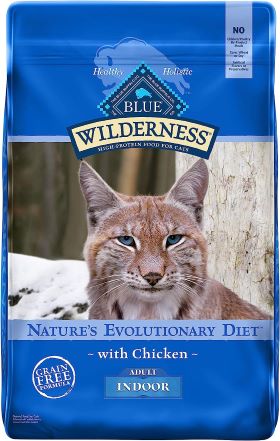
- Dry Cat Food.
- High Protein concentration.
- High Taurine amounts.
Introducing our BLUE Wilderness High Protein Indoor Dry Cat Food, specially crafted to meet the unique dietary needs of indoor cats who require high protein diets (such as Maine Coons). Packed with real chicken, this high-protein formula helps build and maintain lean muscle mass, catering to your feline’s wild instincts. Grain-free and gluten-free, it supports healthy weight and digestion without compromising on taste or nutrition.
Formulated with BLUE’s exclusive LifeSource Bits, a precise blend of antioxidants, vitamins, and minerals, this cat food bolsters the immune system for overall health. Crafted with the finest natural ingredients and free from by-product meals, corn, wheat, soy, artificial flavors, or preservatives, it’s a nutritious choice you can trust.
SHEBA PERFECT PORTIONS Paté Adult Cat Food
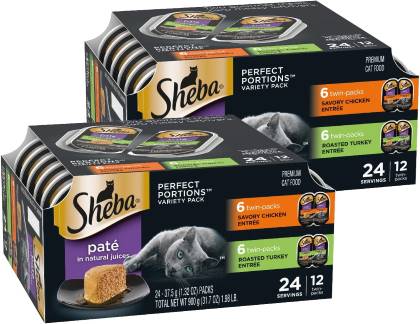
- Wet Food.
- High Moisture Content.
- Multiple flavors available.
With 100% complete and balanced nutrition enriched with essential vitamins and minerals, this variety pack offers three delectably soft entrées with irresistible flavors that cats adore. Great for cats who like a little spice in their life.
Each easy-to-use tray ensures zero messy leftovers, making mealtime a breeze. Just snap, peel, and serve – two convenient servings per tray allow you to feed your Maine Coon exactly what they need. Best of all, this cat food is made without grain, corn, wheat, or soy, and contains no artificial flavors or preservatives, providing you with the peace of mind that comes with offering your beloved feline the best nutrition possible.
Purina ONE High Protein, Grain Free Dry Cat Food
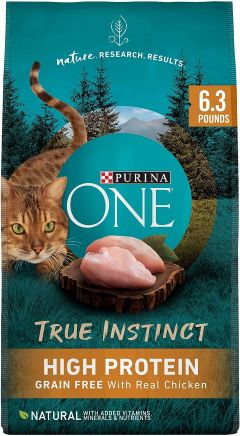
- Dry Cat Food.
- Reasonable Price.
- Grain Free Food.
- High Protein.
Introducing Purina ONE True Instinct, a premium and nourishing dry cat food designed specifically for your Maine Coon’s dietary needs. Packed with real chicken as the number one ingredient, this grain-free formula provides a whopping 35 percent protein to promote strong muscles, including a healthy heart. Enriched with omega-6 fatty acids, it fosters a radiant coat and healthy skin, while the inclusion of four antioxidant sources bolsters your cat’s immune system.
Crafted with added vitamins, minerals, and nutrients, this veterinarian-recommended formula ensures your feline friend receives a balanced and wholesome diet. Developed in Purina-owned, U.S. facilities, the high-quality ingredients are carefully blended into tasty, crunchy cat food bites and tender, meaty morsels, making mealtime an enticing and delightful experience for your beloved Maine Coon.
Purina Fancy Feast High Protein Senior Wet Cat Food
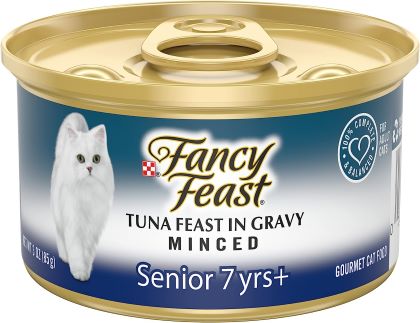
- Wet Cat Food.
- Designed for Senior Cats.
- Easy to eat and digest.
- High Protein.
Introducing Purina Fancy Feast High Protein Senior Gravy Wet Cat Food, specially formulated to cater to the dietary needs of adult cats age 7 and older. Each package contains twenty-four 3 oz. cans, providing your beloved Maine Coon with complete and balanced nutrition.
Packed with antioxidants to boost the immune system, this cat food supports your feline friend’s overall health and vitality. The inclusion of taurine helps maintain clear vision, while high levels of vitamin E nourish their skin and coat, keeping them looking and feeling their best. Crafted with real tuna, the minced morsels offer a tender texture that your Maine Coon will find irresistibly delightful.
Homemade Food Options for Maine Coon Cats
Homemade cat food can be an excellent option for Maine Coon cats, as it allows you to have full control over the ingredients and ensure your feline friend receives a nutritious and balanced diet. Before preparing homemade food, consult with a veterinary nutritionist to ensure you meet your Maine Coon’s specific dietary needs. Here are three homemade recipes to consider:
1. Chicken and Rice Delight:
Ingredients:
- 1 cup of cooked boneless chicken (shredded)
- 1/2 cup of cooked rice
- 1/4 cup of cooked and mashed carrots
- 1/4 cup of cooked and mashed green beans
- 1/4 cup of chicken broth (low sodium)
Steps:
- Cook the chicken thoroughly and shred it into small, bite-sized pieces.
- Cook the rice according to package instructions until it is soft and fully cooked.
- Mash the cooked carrots and green beans until they are a smooth consistency.
- Mix the shredded chicken, cooked rice, mashed carrots, and green beans together in a bowl.
- Gradually add the chicken broth to the mixture to achieve the desired texture.
- Allow the food to cool completely before serving to your Maine Coon.
2. Fish and Sweet Potato Medley:
Ingredients:
- 1 cup of cooked fish (such as salmon or trout), flaked
- 1/2 cup of cooked and mashed sweet potato
- 1/4 cup of cooked and mashed peas
- 1/4 cup of fish broth (low sodium)
Steps:
- Cook the fish thoroughly and flake it into small pieces.
- Cook the sweet potato until it is soft and can be easily mashed.
- Cook the peas until they are tender and can be mashed into a smooth consistency.
- In a mixing bowl, combine the flaked fish, mashed sweet potato, and mashed peas.
- Gradually add the fish broth to the mixture to create a moist and palatable texture.
- Allow the food to cool before serving to your Maine Coon.
3. Beef and Pumpkin Stew:
Ingredients:
- 1 cup of cooked and finely chopped lean beef
- 1/2 cup of cooked and mashed pumpkin
- 1/4 cup of cooked and mashed sweet potato
- 1/4 cup of cooked and chopped spinach
- 1/4 cup of beef broth (low sodium)
Steps:
- Cook the lean beef thoroughly and finely chop it into small pieces.
- Cook the pumpkin and sweet potato until they are soft and can be easily mashed.
- Cook the spinach until it is wilted and chop it into small pieces.
- In a mixing bowl, combine the chopped beef, mashed pumpkin, mashed sweet potato, and chopped spinach.
- Gradually add the beef broth to the mixture to create a stew-like consistency.
- Allow the food to cool down before serving it to your Maine Coon.
Foods to Avoid Feeding Maine Coon Cats
As responsible pet owners, it is crucial to be aware of foods that can be harmful or toxic to Maine Coon cats. These large and majestic felines, like all cats, have specific sensitivities to certain human foods that can lead to severe health issues or even be life-threatening. To safeguard your Maine Coon’s well-being, follow this comprehensive guide to identify and avoid these dangerous foods:
1. Chocolate: One of the most well-known toxic foods for cats, chocolate contains theobromine and caffeine, which can lead to vomiting, diarrhea, increased heart rate, seizures, and even death. Keep all chocolate products well out of reach from your Maine Coon cat.
2. Onions and Garlic: These common kitchen ingredients, whether raw, cooked, or in powdered form, can damage a cat’s red blood cells, leading to anemia and potential organ damage. Avoid feeding any foods that contain onions or garlic, such as soups, stews, or seasoned meats.
3. Grapes and Raisins: Grapes and raisins can cause kidney failure in cats, even in small amounts. As some cats may enjoy the sweetness of these fruits, it is essential to ensure they do not have access to any grape-related products.
4. Alcohol and Caffeine: Even small amounts of alcohol and caffeine can be extremely dangerous to cats. These substances can cause neurological issues, tremors, and even coma in severe cases. Never offer alcoholic beverages or foods containing caffeine to your Maine Coon cat.
5. Xylitol: Found in sugar-free products like gum, candies, and some baked goods, xylitol is highly toxic to cats and can cause a rapid release of insulin, leading to low blood sugar and potential liver failure.
6. Dairy Products: While some cats may tolerate small amounts of dairy, many are lactose intolerant, and dairy consumption can lead to digestive upset, including diarrhea.
7. Raw Meat and Fish: Raw meat and fish can harbor harmful bacteria and parasites that may cause food poisoning and gastrointestinal issues in cats. Always cook meat and fish thoroughly before offering them as treats.
8. Bones: Avoid giving cooked bones to your Maine Coon cat, as they can splinter and pose choking hazards or cause internal injuries.
9. Canned Tuna for Humans: While small amounts of tuna may be acceptable, avoid feeding your Maine Coon cat excessive amounts of canned tuna intended for human consumption. It lacks essential nutrients and can lead to mercury poisoning if consumed regularly.
10. Medications and Household Products: Never administer human medications or household products to your cat without veterinary supervision. Many medications and chemicals intended for human use can be toxic to cats, even in small quantities.
Ending Note
Feeding Maine Coon cats a well-balanced and appropriate diet is paramount to their health and happiness. By understanding their natural diet, nutritional requirements, and various feeding options, pet owners can make informed choices to meet the dietary needs of their majestic feline companions.
Responsible pet ownership, regular veterinary check-ups, and a proper diet contribute to the well-being and longevity of Maine Coon cats, ensuring they continue to bring joy and companionship to their families for many years to come.
